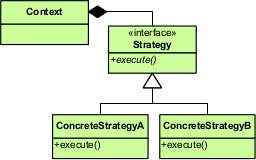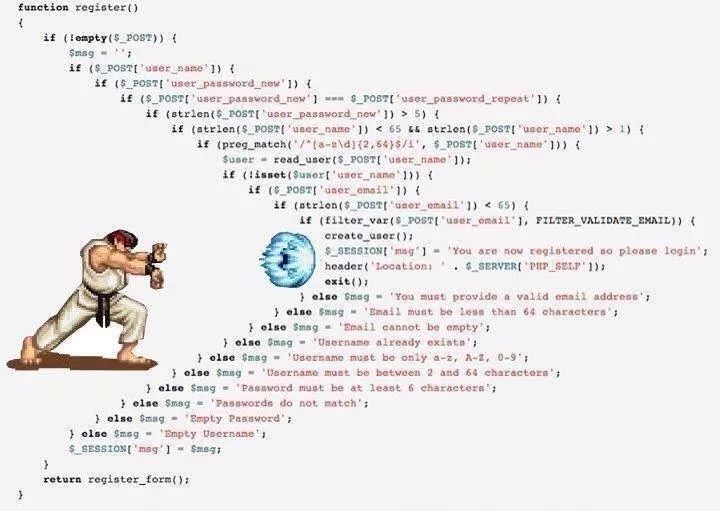[TOC] python–策略模式 前言 策略模式作為一種軟體設計模式,指對象有某個行為,但是在不同的場景中,該行為有不同的實現演算法。 策略模式: 定義了一族演算法(業務規則); 封裝了每個演算法; 這族的演算法可互換代替(interchangeable) 不會影響到使用演算法的客戶. 結構圖 一. 應用 ...
目錄
python–策略模式
前言
策略模式作為一種軟體設計模式,指對象有某個行為,但是在不同的場景中,該行為有不同的實現演算法。
策略模式:
- 定義了一族演算法(業務規則);
- 封裝了每個演算法;
- 這族的演算法可互換代替(interchangeable)
- 不會影響到使用演算法的客戶.
結構圖

一. 應用
下麵是一個商場的活動實現
#!/usr/bin/env python
# ~*~ coding: utf-8 ~*~
# 現金收費抽象類
class CashSuper(object):
def accept_cash(self, money):
pass
class CashNormal(CashSuper):
"""策略1: 正常收費子類"""
def accept_cash(self, money):
return money
class CashRebate(CashSuper):
"""策略2:打折收費子類"""
def __init__(self, discount=1):
self.discount = discount
def accept_cash(self, money):
return money * self.discount
class CashReturn(CashSuper):
"""策略3 返利收費子類"""
def __init__(self, money_condition=0, money_return=0):
self.money_condition = money_condition
self.money_return = money_return
def accept_cash(self, money):
if money >= self.money_condition:
return money - (money / self.money_condition) * self.money_return
return money
# 具體策略類
class Context(object):
def __init__(self, cash_super):
self.cash_super = cash_super
def GetResult(self, money):
return self.cash_super.accept_cash(money)
if __name__ == '__main__':
money = input("原價: ")
strategy = {}
strategy[1] = Context(CashNormal())
strategy[2] = Context(CashRebate(0.8))
strategy[3] = Context(CashReturn(100, 10))
mode = int(input("選擇折扣方式: 1) 原價 2) 8折 3) 滿100減10: "))
if mode in strategy:
cash_super = strategy[mode]
else:
print("不存在的折扣方式")
cash_super = strategy[1]
print("需要支付: ", cash_super.GetResult(money))
類的設計圖如下

使用一個策略類CashSuper定義需要的演算法的公共介面,定義三個具體策略類:CashNormal,CashRebate,CashReturn,繼承於CashSuper,定義一個上下文管理類,接收一個策略,並根據該策略得出結論,當需要更改策略時,只需要在實例的時候傳入不同的策略就可以,免去了修改類的麻煩
二. 避免過多使用if…else
對於業務開發來說,業務邏輯的複雜是必然的,隨著業務發展,需求只會越來越複雜,為了考慮到各種各樣的情況,代碼中不可避免的會出現很多if-else。
一旦代碼中if-else過多,就會大大的影響其可讀性和可維護性。

首先可讀性,不言而喻,過多的if-else代碼和嵌套,會使閱讀代碼的人很難理解到底是什麼意思。尤其是那些沒有註釋的代碼。
其次是可維護性,因為if-else特別多,想要新加一個分支的時候,就會很難添加,極其容易影響到其他的分支。
下麵來介紹如何使用策略模式 消除if …else
示例: 將如下函數改寫成策略模式
# pay_money.py
#!/usr/bin/env python
# ~*~ coding: utf-8 ~*~
def get_result(type, money):
"""商場促銷"""
result = money
if money > 10000:
if type == "UserType.SILVER_VIP":
print("白銀會員 優惠50元")
result = money - 50
elif type == "UserType.GOLD_VIP":
print("黃金會員 8折")
result = money * 0.8
elif type == "UserType.PLATINUM_VIP":
print("白金會員 優惠50元,再打7折")
result = money * 0.7 - 50
else:
print("普通會員 不打折")
result = money
return result策略模式如下
class CashSuper(object):
"""收款抽象類"""
def pay_money(self,money):
pass
class SilverUser(CashSuper):
"""策略1:白銀會員收費模式"""
def __init__(self, discount_money=50):
self.discount_money = discount_money
def pay_money(self,money):
return money - self.discount_money
class GoldUser(CashSuper):
"""策略2: 黃金會員收費模式"""
def __init__(self,discount=0.8):
self.discount = discount
def pay_money(self,money):
return money* self.discount
class PlatinumUser(CashSuper):
"""策略3: 白金會員收費模式"""
def __init__(self,discount_money=50,discount=0.7):
self.discount_money = discount_money
self.discount = discount
def pay_money(self,money):
if money >= self.discount_money:
return money* self.discount - self.discount_money
return money
class NormalUser(CashSuper):
"""策略4: 正常會員不打折"""
def pay_money(self,money):
return money
class Context(object):
"""具體實現的策略類"""
def __init__(self,cash_super):
"""初始化:將策略類傳遞進去作為屬性"""
self.cash_super = cash_super
def get_result(self,money):
return self.cash_super.pay_money(money)
def main(money, user_type):
"""程式入口"""
if money < 1000:
return money
if user_type == "UserType.SILVER_VIP":
strategy = Context(SilverUser())
elif user_type == "UserType.GOLD_VIP":
strategy = Context(GoldUser())
elif user_type == "UserType.PLATINUM_VIP":
strategy = Context(PlatinumUser())
else:
strategy = Context(NormalUser())
return strategy.get_result(money)三. 使用策略,工廠模式.
代碼如下
#!/usr/bin/env python
# ~*~ coding: utf-8 ~*~
"""
使用策略模式 + 工廠模式
"""
class StrategyFactory(object):
"""工廠類"""
strategy = {}
@classmethod
def get_strategy_by_type(cls, type):
"""類方法:通過type獲取具體的策略類"""
return cls.strategy.get(type)
@classmethod
def register(cls, strategy_type, strategy):
"""類方法:註冊策略類型"""
if strategy_type == "":
raise Exception("strategyType can't be null")
cls.strategy[strategy_type] = strategy
class CashSuper(object):
"""收款抽象類"""
def pay_money(self, money):
pass
def get_type(self):
pass
class SilverUser(CashSuper):
"""策略1:白銀會員收費模式"""
def __init__(self, discount_money=50):
self.discount_money = discount_money
def pay_money(self, money):
return money - self.discount_money
def get_type(self):
return "UserType.SILVER_VIP"
def collect_context(self):
StrategyFactory.register(self.get_type(), SilverUser)
class GoldUser(CashSuper):
"""策略2: 黃金會員收費模式"""
def __init__(self, discount=0.8):
self.discount = discount
def pay_money(self, money):
return money * self.discount
def get_type(self):
return "UserType.GOLD_VIP"
def collect_context(self):
StrategyFactory.register(self.get_type(), GoldUser)
class PlatinumUser(CashSuper):
"""策略3: 白金會員收費模式"""
def __init__(self, discount_money=50, discount=0.7):
self.discount_money = discount_money
self.discount = discount
def pay_money(self, money):
if money >= self.discount_money:
return money * self.discount - self.discount_money
return money
def get_type(self):
return "UserType.PLATINUM_VIP"
def collect_context(self):
StrategyFactory.register(self.get_type(), PlatinumUser)
class NormalUser(CashSuper):
"""策略4: 正常會員不打折"""
def pay_money(self, money):
return money
def get_type(self):
return "UserType.Normal"
def collect_context(self):
StrategyFactory.register(self.get_type(), NormalUser)
def InitialStrategys():
"""初始化方法:收集策略函數"""
NormalUser().collect_context()
PlatinumUser().collect_context()
GoldUser().collect_context()
SilverUser().collect_context()
def main(money, type):
"""入口函數"""
InitialStrategys()
strategy = StrategyFactory.get_strategy_by_type(type)
if not strategy:
raise Exception("please input right type!")
return strategy().pay_money(money)
if __name__ == "__main__":
money = int(input("show money:"))
type = input("Pls input user Type:")
result = main(money, type)
print("should pay money:", result)
通過一個工廠類StrategyFactory,在我們在調用register類方法時將策略收集到策略中,根據傳入 type,即可獲取到對應 Strategy
消滅了大量的 if-else 語句。



